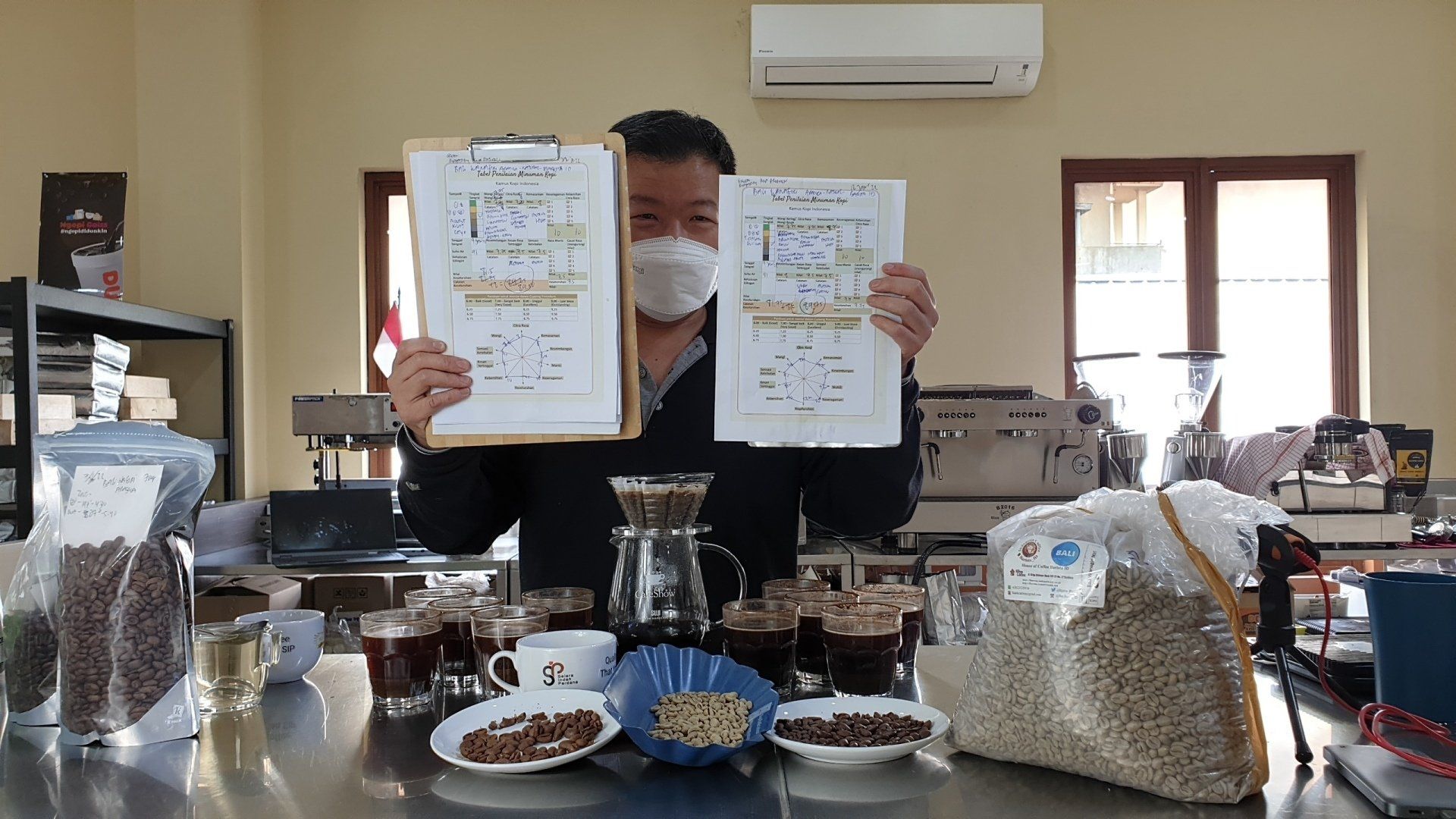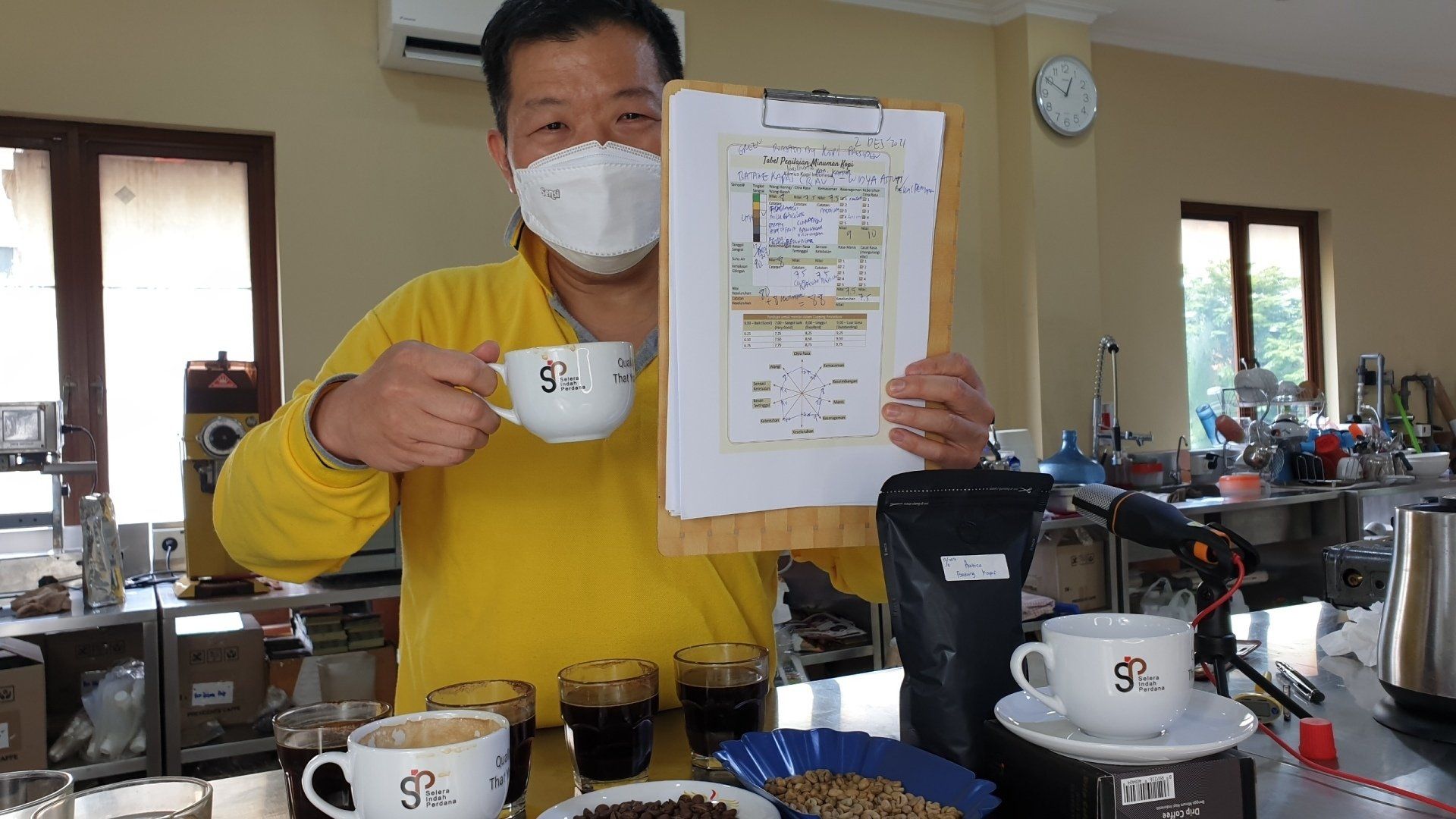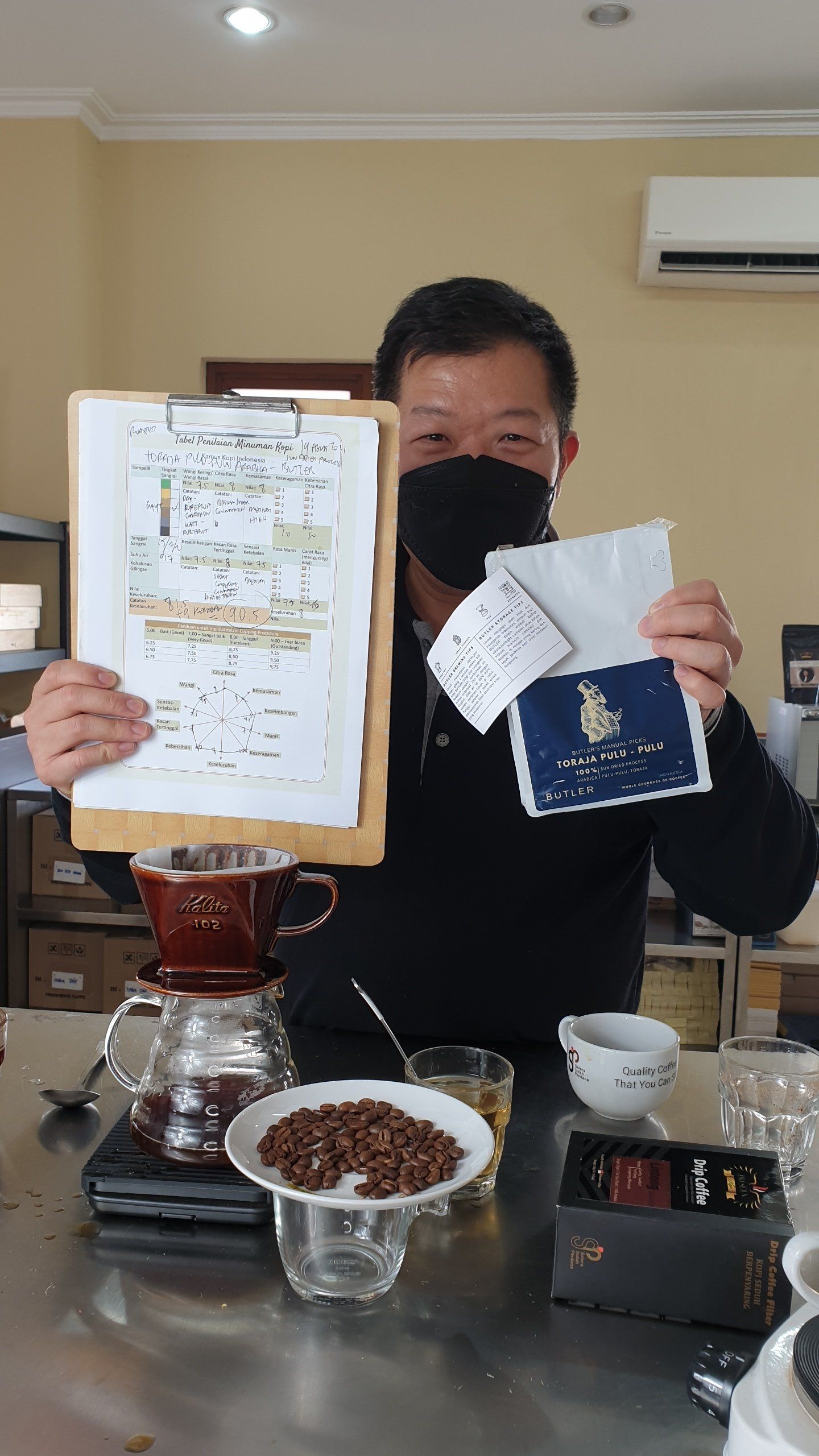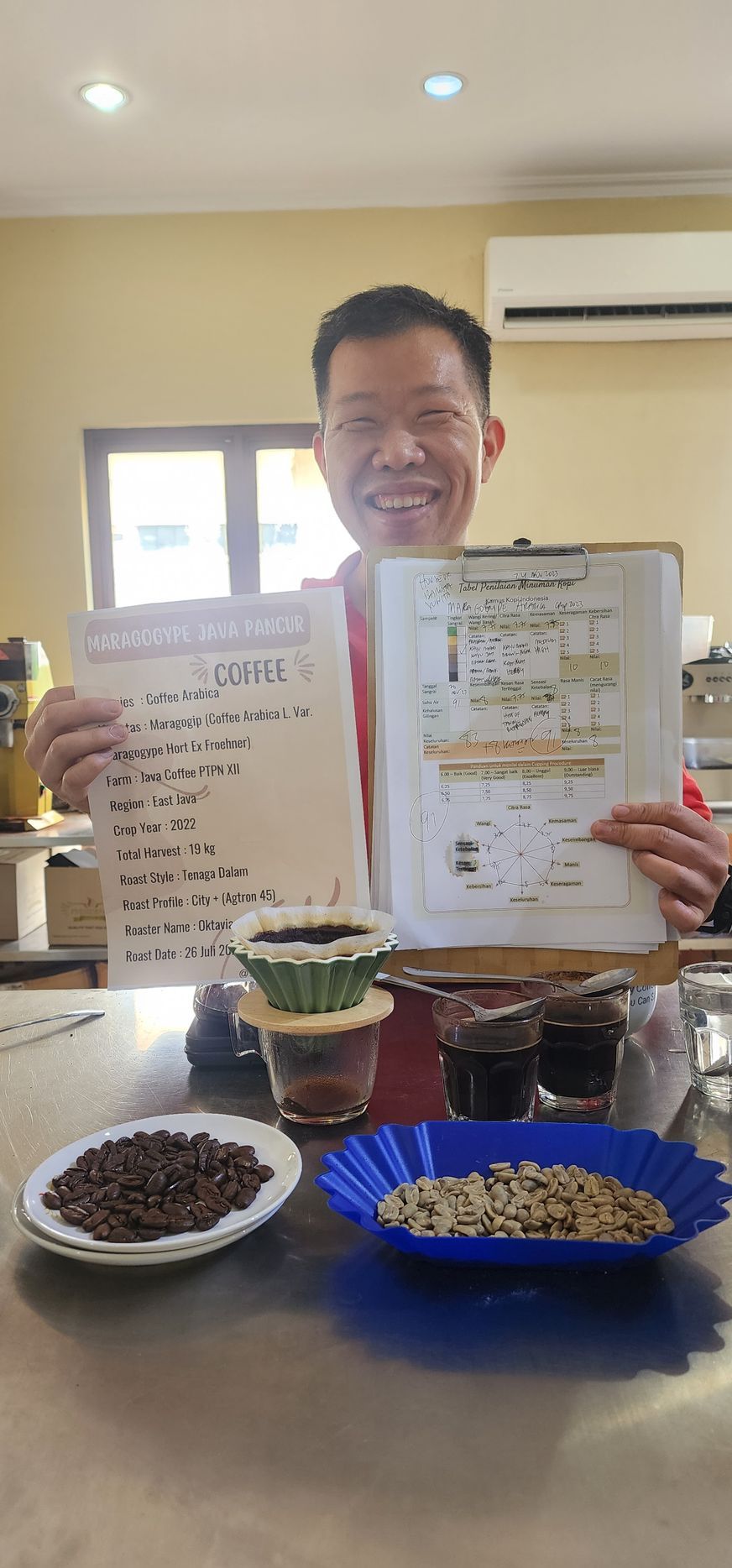Indonesia Coffee Review /
Ulasan Kamus Kopi

Kamus Kopi received this excelsa coffee from Mr. Jeffry Milansyah (Alam Waras.) Excelsa Coffee is authentic coffee from traditional coffee farm in the city of Pagar Alam, South Sumatera, Indonesia. The city is located at the hilly ground with quite low temperature for the whole year (about 22,91 C according to hperkotaan.bpiw.pu.go.id) It has one mountain (Dempo) and seven rivers (according to Wikipedia.) The city has wide area of green forest which protecting many ecosystems including Sumatran tigers, golden cats and forest goats. Mr. Jeffry informed that the harvest season for Excelsa is from June to August. The excelsa is currently still undervalue than other coffee's families. He asked for improving and promoting this excelsa from Pagar Alam. Kamus Kopi reviewed it with SCAA cupping protocol. The cupping notes were cinnamon, palm sugar, earthy, hint of fruit, medium:acidity, medium low:body, short lingering, hint of herbal:after taste. Steve brewed it again with Suji dripper with paper filter. He asked Chery to join the review. Chery noticed the fruity, acidity and easy to drink from the excelsa. With that Steve confirmed his cupping. But overall, the excelsa Pagar Alam has potential to be fine coffee. The Kamus Kopi score was 88 For full video, please visit Youtube Kamus Kopi Indonesia, https://youtu.be/EnJ-4G5jg-c

Kamus Kopi received special coffees, Bali Wanagiri arabica from House Barista ID. Bali Wanagiri arabica is authentic coffee from "forest" coffee farm in the district of Buleleng, Balu, Indonesia. Wanagiri village is located about 1220 masl. The district Buleleng itself is located at the northest of Bali island. The main crops from Buleleng are salak (snake fruit), jeruk keprok (mandarin cirtus.) And the name of Wanagiri itself is a combination of two words. Wana means forest. and Giri means hill. (according to Wikipedia.) Besides that, there are many breath taking sites that very good for tourism. Mrs. Yunita from House of Barista informed that this particular beans were selected as favorite one at International event (supported by the Ministry of Trade of Indonesia) in Germany in 2021. The farmers processed the beans in natural, full washed and honey. The cupping scores taken from the event were 83.5, 83.25, and 80. On 7 Jan 2022, Steve of Kopi Presiden roasted the green beans to the color of City roast (Ngebut Kilat style) and to the color of Full City roast (Tenaga Dalam style.) Kamus Kopi reviewed it with SCAA cupping protocol. The cupping notes for the Ngebut Kilat were brown sugar, cinnamon :fragrance, brown sugar, honey :aroma, cinnamon, salted honey :flavors, medium high:acidity, medium:body, pleasant :after taste. The cupping notes for Tenaga Dalam were brown sugar, raisin: fragrance, brown sugar, molasses-fruity: aroma, brown sugar, raisin, cinnamon: flavors, medium high: acidity, medium coating: body, short lingering: after taste. Steve brewed it again with April brewer and paper filter (Suji Premium.) Steve asked Intan to join the review. She tasted the special flavor of orange peel in the coffee. In conclusion, the Bali Wanagiri arabica was a specialty coffee. The Kamus Kopi score was 89.50 for Ngebut Kilat and 89.75 for Tenaga Dalam. For full video, please visit Youtube Kamus Kopi Indonesia, https://youtu.be/yJDLskAsK1A

RKamus Kopi received exotic coffee of Riau from Widya Astuti. Batang Kapas robusta is authentic coffee from a small coffee farm in the district of Kampar, Riau, Indonesia. The district Kampar was established around the 1956. There are two big rivers pass through the district, Kampar kanan dan Kampar kiri (according to Wikipedia.) When we look at the map of Sumatera island, the district is located in the center of Sumatera. And the district of Kampar is also well known as the Veranda of Mecca in the Riau. Mrs. Widya from Bekal Pemimpin informed that this particular beans were from small village, Lubuk Bigau. This village is located next to the conservation forest of Bukit Rimbang Bukit Baling. The farms are located at 200 - 250 masl. The farmers plant multiple varietals. The traditional post harvest process is natural process. And this village is still practicing traditionally agriculture practice, without using machine. Currently, the producing coffee area is just 7 Ha from 60 Ha area. Currently his farm capacity is about 300 Kg / month. Dea of Kopi Presiden roasted the green beans to the color of City+ roast on the 12th of Nov 2021. Kamus Kopi reviewed it with SCAA cupping protocol. The cupping noteswere milk chocolate, earthy, hint of fruit :fragrance, hint of fruit & brown sugar:aroma, cinnamon, brown sugar, hint of vinegar :flavors, medium:acidity, medium :body, clean & refreshing :after taste. Steve brewed it again with La Marzocco GS3 espresso machine. He brewed it into espresso and Cappuccino. He asked Intan to join the review. Intan was surprised that the robusta's taste was so soft, more like the arabica's. With that Steve confirmed his cupping. But overall, the Batang Kapas robusta was a very fine robusta. The Kamus Kopi score was 88 For full video, please visit Youtube Kamus Kopi Indonesia, https://youtu.be/LmFhTKMRg8Y

Kamus Kopi received special coffees, Papua Nabire arabica from House Barista ID. Papua Nabire arabica is authentic coffee from a small coffee farm in the district of Nabire, Papua, Indonesia. The district Nabire was established around the 1966. There are about 172.960 people lives in the District of Nabire in 2021 (according to Wikipedia.) When we look at the map of Papua island, the island looks like a bird silhouette. And the district of Nabire is located at the bird's neck. Mrs. Yunita from House of Barista informed that this particular beans were from small village, Oksibil at Bintang Mountain. The farms are located at 1800 - 2000 mdpl. The farmers plant multiple varietals. The main harvest season are May- August. The traditional post harvest processes are full washed. Currently his farm capacity is about 7 Mton / harvest. Octa of Kopi Presiden roasted the green beans to the color of City roast on the 3rd of November 2021. Kamus Kopi reviewed it with SCAA cupping protocol. The cupping notes for the roasted coffee were nutty, cinnamon, fruity :fragrance, fruity :aroma, green, nutty, overripe cherry/vinegary :flavors, medium:acidity, medium low :body, lingering hint of leaf :after taste. The cupping notes were fruity, nutty & cinnamon: fragrance, fruity & cinnamon: aroma, fruity-raspberry, brown sugar, cinnamon: flavors, medium high: acidity, medium high: body, hint of mouthful tannin: after taste. Steve brewed it again with Kalita brewer and paper filter. With that Steve confirmed his cupping. But overall, the Papua Nabire arabica was a specialty coffee. The Kamus Kopi score was 91.5. For full video, please visit Yout ube Kamus Kopi Indonesia, https://youtu.be/jJ-_dewUvTM

Kamus Kopi received a special coffee, Lani Mendek arabica from Mr. Marsyel. Lani Mendek arabica is authentic coffee from a small coffee farm in the district of Lanny Jaya, Papua, Indonesia. The district Lanny Jaya was established in the 2008. The city of Tiom is the administrative city of Lanny Jaya. The total area of Lanny Jaya is about 6.077 km2 (according to Wikipedia.) The highest elevation is about 4.500 masl. And the average elevation is about 1.700 masl (according to topographic-map.com). Therefore this district is suitable for producing quality arabica coffee. Especially Lanny jaya has fertile soil from the tropical forests. Mr. Marsyel helps his friend in marketing and improving of the coffee. His friend is the coffee farmer. His friend name is Mr. Moses Yigibalom. According to Mr. Marsyel, Mr. Moses's farm still has the original seeds that planted by BPPT in the 1986. The main varieties are kartika, lini S and KT. The main harvest season are in April, June and August. The traditional post harvest processes are fullwash and natural. Currently his farm capacity is about 500Kg in a year. Mr. Moses still need lots of supports especially with the equipment. Mr. Moses is roasting his coffee with sample roaster only. There is a special note printed on the packaging label. It says "Nina Kopi Purompaga Mendek" It has a very authentic meaning, We have coffee from the Mountain. Kamus Kopi received three bags from Mr. Marsyel. One is roasted coffee (roasted by Mr. Moses). Another one is green beans with natural process. And another bag is green beans with full wash process. Bayu of Kopi Presiden roasted the green beans to the color of City roast on the 4th of October 2021. Kamus Kopi reviewed it with SCAA cupping protocol. The cupping notes for the roasted coffee were nutty, cinnamon, fruity :fragrance, fruity :aroma, green, nutty, overripe cherry/vinegary :flavors, medium:acidity, medium low :body, lingering hint of leaf :after taste. The cupping notes for the natural process were brown sugar, earthy, cinnamon: fragrance, fruity & brown sugar: aroma, brown sugar, earthy & vinegary: flavors, medium: acidity, medium high: body, hint of tobacco/cinnamon: after taste. The cupping notes for the full wash process were brown sugar, fruity: fragrance, brown sugar, fruity & hint of flower: aroma, fruity, brown sugar & vinegary: flavors, medium high: acidity, sweet, refreshing: after taste. Steve brewed it again with April glass brewer which manufactured by Suji Bandung. He asked Dea to join the review. According to Dea, the coffee showed thicker body and woody notes. But overall, they all enjoyed this specialty coffee. The Kamus Kopi score was 92 for the full wash, 90,5 for the natu ral, and 88 for the roasted coffee. For full video, please visit Youtube, https://youtu.be/TTZ1Xuvnj4s

Kamus Kopi received special request from Mr Nelson of Butler to review this Toraja Pulu-pulu. Pulu-pulu is an area in the Region of North Toraja, South Sulawesi, Indonesia. The area is located about 1800 masl. The major varietals are Typica and Lini-S. The harvest period is usually around December. The common post harvest process is full washed. However this Butler's Toraja Pulu pulu was labeled as Sun dried which usually refer to Natural (dry) process. Butler roasted the coffee to the color of City+ roast on 17 July 2021. Steve cup the coffee according to SCAA cupping protocol. The cupping notes were, fragrance: ripefruit & cinnamon, aroma: ripefruit, flavors: brown sugar & cinnamon, acidity: medium high, body: medium, after taste: short lingering cinnamon & hint of tannin. Steve brewed it again with Kalita and paper filter. Steve asked Dian to join the review. Dian noticed the standout acidity from the coffee. Then she also noticed the tamarind after taste. Overall they both agreed that this is a specialty coffee. The Kamus Kopi score was 90.5 For full video, please visit Youtube Kamus Kopi Indonesia, https://youtu.be/GYKYPdP4HjE

Kamus Kopi received a special request from Mr. Nelson to review the Bali Kintamani arabica. Kintamani is located at northern of Bali. It is an area in the region of Bangli, Indonesia. Not only it has sacred Puras but also beautiful sceneries and exotic coffee. In addition to the high altitude (with elevation of 1300 – 1600 masl), the fertile soil "Volcanic Mountain Batur" plus the abundant water "Lake Batur" are great combination to grow arabica trees. Kamus Kopi received the Sun-dried process which usually refer to Natural process. Steve reviewed them with SCAA cupping protocol. The cupping notes for “Sun Dried” Bali Kintamani arabica were brown sugar & cinnamon: fragrance, ripe fruit of lime :aroma, brown sugar & lemony :flavors, medium high (when cooler it increased):acidity, medium low: body, sweet, clean & refreshing :after taste. Steve brewed it again with La Marzocco “GS3” espresso machine. At first, he brewed the espresso and latte. And then he asked Chery to join the review. They noticed the high acidity in the espresso. When they tried the lattes, the coffee’s tastes were weak. So they poured the leftover espresso to boost up the coffee flavors. But they agreed that this was specialty coffee. The Kamus Kopi score were 90,5 for the Sun-Dried Kintamani Arabica. For full video, please visit Youtube Kamus Kopi Indonesia, https://youtu.be/Gtx_sF8CCzM



